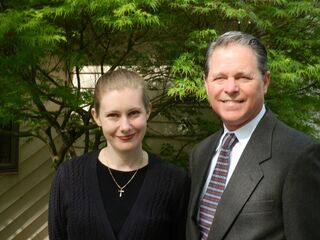Friends
Thanks, Dad!
On Father’s Day, I remember my dad’s role in my recovery from schizophrenia.
Posted June 19, 2021
Key points
- Thank you, Dad, for sacrificing your time and money throughout my whole life to make my academic dreams come true.
- Thank you, Dad, for never giving up on me, even when I was told I had severe schizophrenia with a poor prognosis.
- Thank you, Dad, for supporting me throughout my difficult recovery.

The earliest memories of my life were happy. My family lived in a little house in a rural Illinois community called Rozetta, where my dad worked as a pastor. I remember the corn fields surrounding the house, the vast blue sky and the wind that blew across the fields. I played in our sandbox which my dad made for me and my brother.
My father earned a bachelor’s degree in piano pedagogy and performance before attending seminary in the Chicago area. Throughout my childhood, I remember Dad playing the piano and teaching piano lessons. There was always music in our home.
He began teaching me to play the piano at age five. I learned on an older piano, and he taped the musical notes such as “F” “C” or “G” on the keys so I could easily learn to read music.
During that time, as I grew, there were no signs of emerging schizophrenia.
A few months before I attended first grade, my family moved to a suburb of Cleveland, Ohio called Mentor, with an excellent school just a few blocks away. When I was seven, the church built a new parsonage (house for the pastor’s family) on church grounds. My dad would pastor Mentor Baptist Church until I was 19.
I began playing the violin at age seven. Early on, Dad became my piano accompanist. When I was in high school, Dad and I would do weddings together. I would play “Here Comes the Bride” on the piano, and then dad would accompany me on piano while I played on a violin solo. Little did I know then how performing together would become an ongoing joy that would stretch far into the future.
In high school, I practiced violin for four hours everyday. I also went to college through a program where I earned dual high school and college credit during my last two years of high school. Between studying and practicing, there was little time left. My social life was suffering, and negatively affective my mental health, but I was unaware of it. I never dreamed that my lack of a normal social life would eventually spiral out of control and lead to extreme isolation and full-blown schizophrenia.
I remember how proud Dad was when I received a financial package from my dream school, USC. I would travel there to follow my dream of becoming a medical researcher.
Although I had a supportive and loving relationship with both of my parents, I lost all interest in my relationship with them during my first three years at USC. I was rarely in touch. Then, I traveled-- I visited China and Africa, and in my mania, also flew to Thailand. I was suddenly failing my classes, too obsessed with travel to focus on anything else. Schizophrenia was distorting my sense of reality, and I wanted nothing to do with old friends or family, especially my loving parents. It was as though I had become a stranger.
I was homeless for four years and completely evaded my Mom and Dad for four and a half. They tried to contact my friends, my professors, my pastor. Dad even traveled to Los Angeles to try to find me. I was not having it. When he was in Los Angeles, and he found me, and I ran away, paranoid of him.
After four years homeless, and on the day when I was picked up by police after screaming back at the voices in my mind, the psychiatric unit called my parents. I thought about how my parents had tried so hard and so many times to get in touch with me, and how my dad had searched to find me at USC. Now I found myself in a psychiatric unit. Why would they still want to see me now?
But they did. And within 24 hours of my hospital admission, they flew from Ohio to LA to see me in the hospital.
I remember seeing Mom and Dad during that first schizophrenia hospitalization in 2007. They looked older. I didn’t recall seeing my dad wear glasses before.
When I was discharged from the hospital, I flew to Ohio to recuperate at my parents’ home. After I recovered, they encouraged me to transfer to the University of Cincinnati. Thanks to their support, I graduated from college in 2011 magna cum laude and today I work as a schizophrenia advocate.
Today, on Father’s Day, I’d like to say THANK YOU, Dad, for never giving up on me, even when my recovery from schizophrenia looked impossible.
Thank you for wanting me back, even after four and a half years of silence as I had forgotten who I was and will always be—your daughter.
Thank you for being the best accompanist I could ever ask for, and for driving me downtown for years to study violin with the music professor at the Cleveland Institute of Music. Thank you for the money you spent to make my dreams in music and in academics possible.
Thank you for being a loyal friend throughout my whole life. Even in the early stages of my recovery from schizophrenia, when I was lethargic and still not thinking clearly, you took time to talk to me about rebuilding my life. You looked right through my mental illness and saw the best of who I am, and you pointed me toward a brighter future.
As the years go by, I can’t wait to spend more time with you and Mom as we make the best of this life we have been given.
Thank you for being a strong pillar in my life, Dad. You’re the very best.




